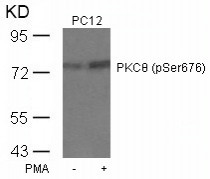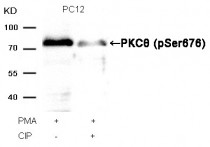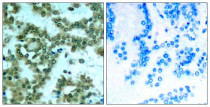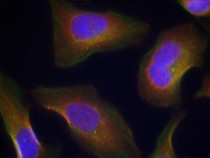ARG51775
anti-PKC theta phospho (Ser676) antibody
anti-PKC theta phospho (Ser676) antibody for ICC/IF,IHC-Formalin-fixed paraffin-embedded sections,Western blot and Human,Mouse,Rat
Cell Biology and Cellular Response antibody; Gene Regulation antibody; Immune System antibody; Signaling Transduction antibody
Overview
| Product Description | Rabbit Polyclonal antibody recognizes PKC theta phospho (Ser676) |
|---|---|
| Tested Reactivity | Hu, Ms, Rat |
| Tested Application | ICC/IF, IHC-P, WB |
| Host | Rabbit |
| Clonality | Polyclonal |
| Isotype | IgG |
| Target Name | PKC theta |
| Antigen Species | Human |
| Immunogen | Peptide sequence around phosphorylation site of serine 676 (R-L-S(p)-F-A) derived from Human PKCθ. |
| Conjugation | Un-conjugated |
| Alternate Names | EC 2.7.11.13; PRKCT; Protein kinase C theta type; nPKC-theta |
Application Instructions
| Application Suggestion |
|
||||||||
|---|---|---|---|---|---|---|---|---|---|
| Application Note | * The dilutions indicate recommended starting dilutions and the optimal dilutions or concentrations should be determined by the scientist. |
Properties
| Form | Liquid |
|---|---|
| Purification | Antibodies were produced by immunizing rabbits with KLH-conjugated synthetic phosphopeptide. Antibodies were purified by affinity-chromatography using epitope-specific phosphopeptide. In addition, non-phospho specific antibodies were removed by chromatogramphy using non-phosphopeptide. |
| Buffer | PBS (without Mg2+ and Ca2+, pH 7.4), 150mM NaCl, 0.02% Sodium azide and 50% Glycerol. |
| Preservative | 0.02% Sodium azide |
| Stabilizer | 50% Glycerol |
| Concentration | 1 mg/ml |
| Storage Instruction | For continuous use, store undiluted antibody at 2-8°C for up to a week. For long-term storage, aliquot and store at -20°C. Storage in frost free freezers is not recommended. Avoid repeated freeze/thaw cycles. Suggest spin the vial prior to opening. The antibody solution should be gently mixed before use. |
| Note | For laboratory research only, not for drug, diagnostic or other use. |
Bioinformation
| Database Links | |
|---|---|
| Gene Symbol | PRKCQ |
| Gene Full Name | protein kinase C, theta |
| Background | This is a calcium-independent, phospholipid-dependent, serine- and threonine-specific enzyme. Essential for T-cell receptor (TCR)-mediated T-cell activation, but is dispensable during TCR-dependent thymocyte development. Links the TCR signaling complex to the activation of NF-kappa-B in mature T lymphocytes. Required for interleukin-2 (IL2) production. |
| Function | Calcium-independent, phospholipid- and diacylglycerol (DAG)-dependent serine/threonine-protein kinase that mediates non-redundant functions in T-cell receptor (TCR) signaling, including T-cells activation, proliferation, differentiation and survival, by mediating activation of multiple transcription factors such as NF-kappa-B, JUN, NFATC1 and NFATC2. In TCR-CD3/CD28-co-stimulated T-cells, is required for the activation of NF-kappa-B and JUN, which in turn are essential for IL2 production, and participates to the calcium-dependent NFATC1 and NFATC2 transactivation. Mediates the activation of the canonical NF-kappa-B pathway (NFKB1) by direct phosphorylation of CARD11 on several serine residues, inducing CARD11 association with lipid rafts and recruitment of the BCL10-MALT1 complex, which then activates IKK complex, resulting in nuclear translocation and activation of NFKB1. May also play an indirect role in activation of the non-canonical NF-kappa-B (NFKB2) pathway. In the signaling pathway leading to JUN activation, acts by phosphorylating the mediator STK39/SPAK and may not act through MAP kinases signaling. Plays a critical role in TCR/CD28-induced NFATC1 and NFATC2 transactivation by participating in the regulation of reduced inositol 1,4,5-trisphosphate generation and intracellular calcium mobilization. After costimulation of T-cells through CD28 can phosphorylate CBLB and is required for the ubiquitination and subsequent degradation of CBLB, which is a prerequisite for the activation of TCR. During T-cells differentiation, plays an important role in the development of T-helper 2 (Th2) cells following immune and inflammatory responses, and, in the development of inflammatory autoimmune diseases, is necessary for the activation of IL17-producing Th17 cells. May play a minor role in Th1 response. Upon TCR stimulation, mediates T-cell protective survival signal by phosphorylating BAD, thus protecting T-cells from BAD-induced apoptosis, and by up-regulating BCL-X(L)/BCL2L1 levels through NF-kappa-B and JUN pathways. In platelets, regulates signal transduction downstream of the ITGA2B, CD36/GP4, F2R/PAR1 and F2RL3/PAR4 receptors, playing a positive role in 'outside-in' signaling and granule secretion signal transduction. May relay signals from the activated ITGA2B receptor by regulating the uncoupling of WASP and WIPF1, thereby permitting the regulation of actin filament nucleation and branching activity of the Arp2/3 complex. May mediate inhibitory effects of free fatty acids on insulin signaling by phosphorylating IRS1, which in turn blocks IRS1 tyrosine phosphorylation and downstream activation of the PI3K/AKT pathway. Phosphorylates MSN (moesin) in the presence of phosphatidylglycerol or phosphatidylinositol. Phosphorylates PDPK1 at 'Ser-504' and 'Ser-532' and negatively regulates its ability to phosphorylate PKB/AKT1. [UniProt] |
| Research Area | Cell Biology and Cellular Response antibody; Gene Regulation antibody; Immune System antibody; Signaling Transduction antibody |
| Calculated MW | 82 kDa |
| PTM | Autophosphorylation at Thr-219 is required for targeting to the TCR and cellular function of PRKCQ upon antigen receptor ligation. Following TCR stimulation, phosphorylated at Tyr-90 and Ser-685. |
Images (4) Click the Picture to Zoom In
-
ARG51775 anti-PKC theta phospho (Ser676) antibody WB image
Western blot: Extracts from PC12 cells untreated or treated with PMA stained with ARG51775 anti-PKC theta phospho (Ser676) antibody.
-
ARG51775 anti-PKC theta phospho (Ser676) antibody WB image
Western blot: Extracts from PC12 cells, treated with PMA or calf intestinal phosphatase (CIP), stained with ARG51775 anti-PKC theta phospho (Ser676) antibody.
-
ARG51775 anti-PKC theta phospho (Ser676) antibody IHC-P image
Immunohistochemistry: Paraffin-embedded Human lung carcinoma tissue stained with ARG51775 anti-PKC theta phospho (Ser676) antibody (left) or the same antibody preincubated with blocking peptide (right).
-
ARG51775 anti-PKC theta phospho (Ser676) antibody ICC/IF image
Immunofluorescence: methanol-fixed HeLa cells stained with ARG51775 anti-PKC theta phospho (Ser676) antibody.









